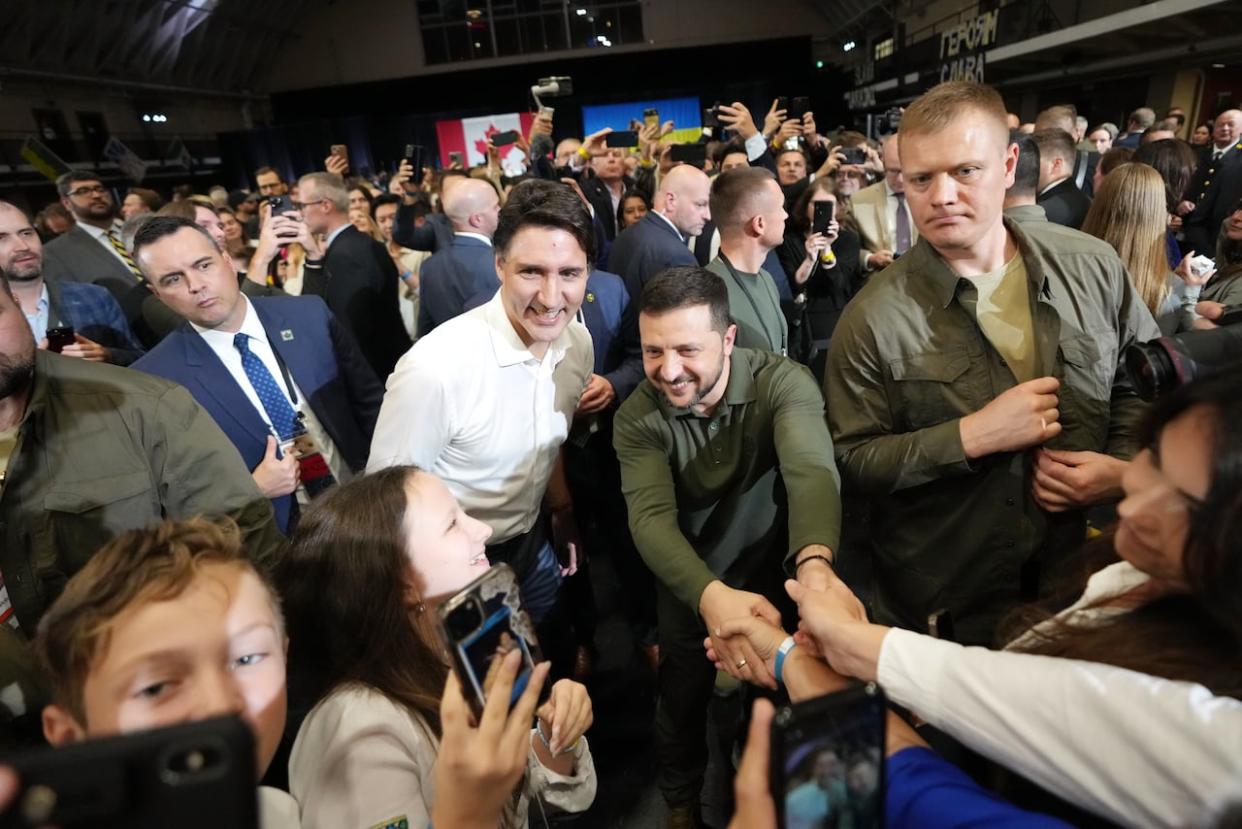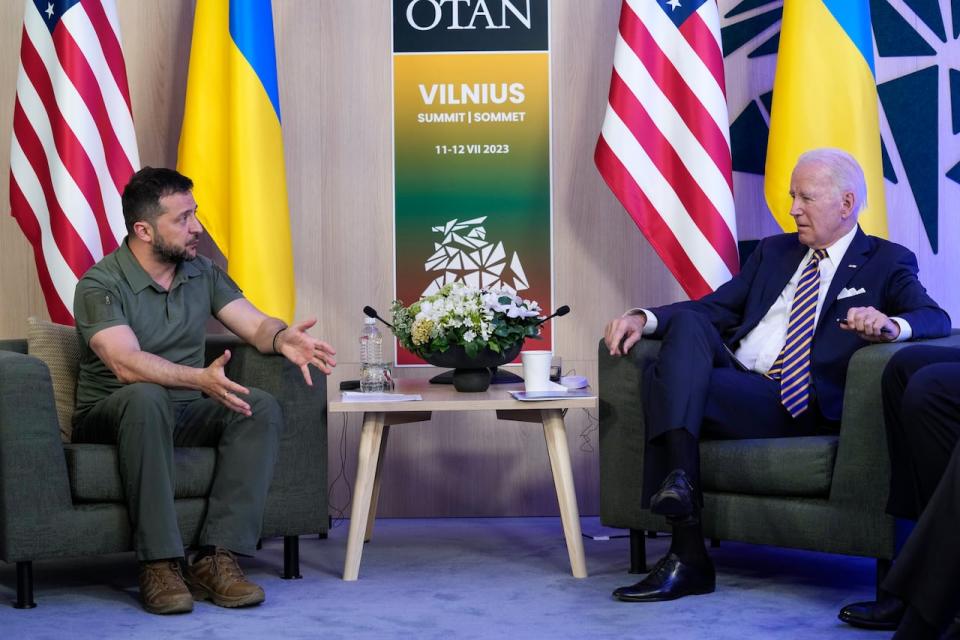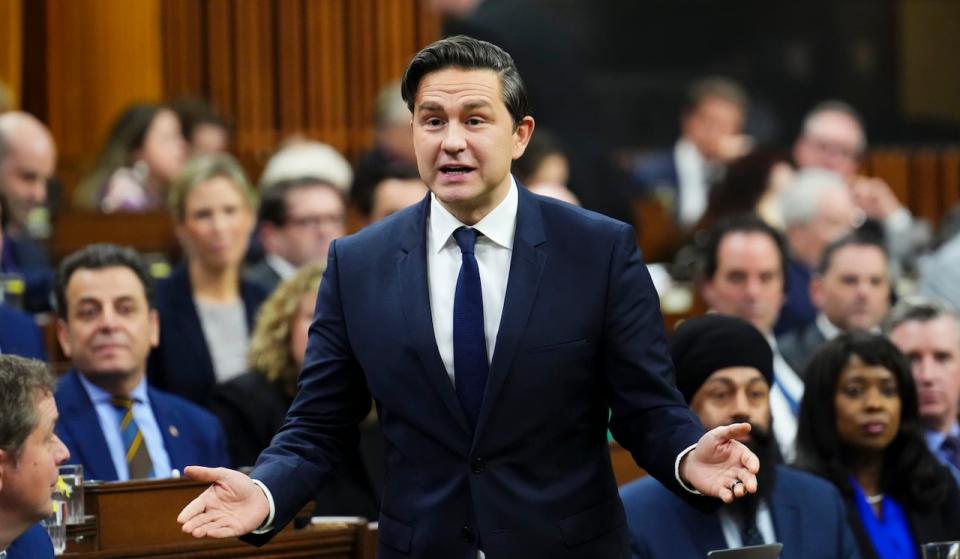Ukraine is looking for more than bland security 'assurances' in talks with Canada, expert says

A significant, even far-reaching event would have slipped almost silently under the radar in Ottawa this week, had it not been for Ukrainian news media.
The Liberal government quietly (perhaps deliberately so) handed over a draft of its proposed security assurances plan for Ukraine to officials in President Volodymyr Zelenskyy's office.
The milestone was acknowledged by Canada's Ambassador to Ukraine Natalka Cmoc, who was widely quoted by several media outlets in Kyiv.
Cmoc spoke about the security plan Monday. It took Global Affairs Canada until Friday to answer a rather straightforward question about what the ambassador had told the Ukrainians. Even then, the department's milquetoast response avoided the central theme, which has preoccupied the debate in the embattled country.
In an interview with the news outlet Ukrainska Pravda, Cmoc made it clear that Canada's promised security measures were best described as "assurances," not "guarantees."
While emphasizing the difference, she said she does not see this parsing of words as a source of friction between the two countries.
"I think the 'assurance' word is very important," Cmoc said. "We are looking to create a document that will provide assurances to Ukraine, and the urgency is here."
For its part, the department described the package as "bilateral security commitments" and said it hopes to complete negotiations swiftly.
"Negotiations are underway and we will have more to say in due course," Charlotte MacLeod, a Global Affairs spokesperson, said in a written statement.

President Joe Biden meets with Ukraine's President Volodymyr Zelenskyy on the sidelines of the NATO summit in Vilnius, Lithuania on July 12, 2023. (Susan Walsh/Associated Press)
As compensation for Ukraine not receiving fast-tracked membership in NATO last summer, G7 nations stepped into the political void by promising to negotiate a series of bilateral security deals that, taken together, would offer reassurance to the war-weary nation as it holds back the full-scale Russian invasion and looks to the future.
Ottawa's relative silence since — or reluctance to acknowledge and substantively discuss the issue — is curious.
The Liberals have taken great pains lately to hammer the Conservatives over their vote late last year against the revised Canada-Ukraine free trade agreement, seeking to paint Opposition Leader Pierre Pollievre as soft in his support for a beleaguered ally.

Conservative Leader Pierre Poilievre rises during question period in the House of Commons on Parliament Hill on Wednesday, Dec. 13, 2023. (Sean Kilpatrick/The Canadian Press)
Under these political circumstances, one might have expected the Liberals to offer a full-throated acknowledgement of the security assurances plan, with lots of the motherhood-and-apple-pie sentiments we've come to expect whenever the war in Eastern Europe is mentioned.
What's even more curious is that Cmoc was given the authority (such things are seldom accidents in the government communications world) to talk publicly about the plan's delivery in the highly charged media environment of Kyiv — where nouns matter more than Ottawa's political establishment seems to realize.
The difference between "assurances" and "guarantees" matters greatly in Ukraine, said defence analyst Oleksandr Musiienko, the head of the Center for Military and Legal Studies in Kyiv.
Long memories
As the Iron Curtain was being rung down in the early 1990s at the end of the Cold War, Ukraine was convinced to give up its share of the former Soviet Union's nuclear arsenal through the Budapest Memorandum — a comprehensive set of three treaties through which the United States, Russia and the United Kingdom agreed to respect Ukraine's internationally recognized borders.
During those negotiations, Ukraine initially demanded legally binding security "guarantees" from Washington against the prospect of invasion. After it became clear that the U.S. wasn't interested in providing such guarantees, the government of the day in Kyiv agreed to accept politically binding security "assurances" in order to protect itself. While China and France did not sign the memorandum, they later extended the same assurances.
Musiienko said Ukrainians have long memories and the Budapest Memorandum "is a big trauma" for the country and its citizens — some of whom have argued quite openly that if they had kept their nuclear arsenal, which was the third largest in the world at the time, they wouldn't be fighting off the Russians today.
"[The] memorandum ... just talked about assurances, no guarantees. So for us, it's very important to know that this will not be a new Budapest Memorandum," he said.
Many defence experts, Musiienko included, acknowledge it would have been economically difficult for Ukraine to adequately and safely maintain a stock of strategic nuclear weapons. (Smaller tactical nuclear weapons might have been a different story.)

An apartment building damaged in a Russian rocket attack in Kharkiv, Ukraine on Wednesday, Jan. 17, 2024. (Kharkiv Regional Administration/The Associated Press)
While in Kyiv on Jan. 12, British Prime Minister Rishi Sunak signed his country's new security agreement with Ukraine's president and simultaneously announced an increase in military funding for the beleaguered country.
Musiienko said that in negotiations with other allies, Canada included, Ukraine will be expecting much more than it got in the 1990s.
"This document, which we signed with the United Kingdom — that's not a Budapest Memorandum. It's more. It's bigger and it means new packages of support and supplying weapons," he said. "It means producing weapons and obligations ... for us and for our partners."
And that, by itself, may explain the uncomfortable silence in Ottawa and the reluctance to make political hay out of an important event.


